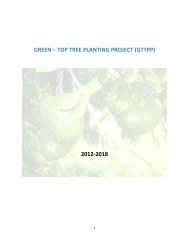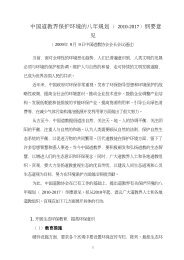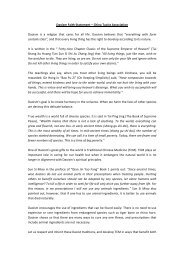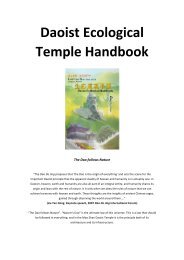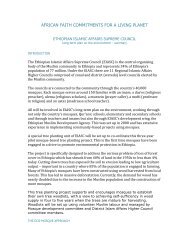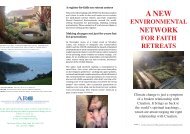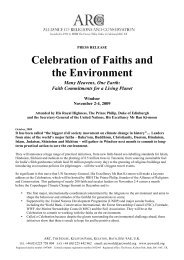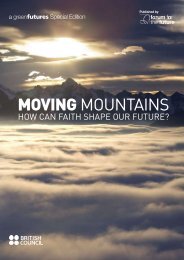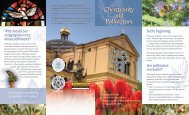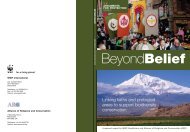summary paper - Alliance of Religions and Conservation
summary paper - Alliance of Religions and Conservation
summary paper - Alliance of Religions and Conservation
You also want an ePaper? Increase the reach of your titles
YUMPU automatically turns print PDFs into web optimized ePapers that Google loves.
MarjaLiisa Swantz<br />
Pr<strong>of</strong>essor Emerita, University <strong>of</strong> Helsinki, Finl<strong>and</strong>:<br />
‘Religion, Gender <strong>and</strong> Development’<br />
Introductory thoughts<br />
I have worked over fifty years closely with grassroots engaged in participatory research <strong>and</strong> practice <strong>and</strong><br />
as a development critic <strong>and</strong> practitioner, mostly in Tanzania. I started by teaching the first generation <strong>of</strong><br />
certified women teachers on Mt. Kilimanjaro, did five years participatory village research on the coast <strong>and</strong><br />
then have developed <strong>and</strong> practiced Participatory Action Research with colleagues <strong>and</strong> villagers in various<br />
parts <strong>of</strong> the country. My present involvement is within NorthSouth local government cooperation<br />
between a Finnish municipality <strong>and</strong> a Tanzanian district.<br />
In my intervention I relate first to such African traditional form <strong>of</strong> life, which respected life <strong>and</strong> helped to<br />
conserve plants <strong>and</strong> forests, <strong>and</strong> in particular women’s part in it. I go on to discuss the women’s dilemma<br />
in more generalized terms <strong>and</strong> end relating thoughts to institutionalized Christian religion.<br />
I have followed development from bottom up in areas, which in statistical terms have been listed as the<br />
poorest <strong>and</strong> most backward in Tanzania. From that perspective the terminology <strong>and</strong> theory <strong>of</strong> sustainable<br />
development looks very different from the prevailing economic view to development. I argue that women’s<br />
view to their own life situation does not fit into the policies <strong>and</strong> strategies promoted for those who in<br />
statistical terms are counted poor, nor even into the vocabulary <strong>of</strong> poverty reduction.<br />
Tanzanian women as a category are not the poorest <strong>of</strong> the poor even if we recognise that the number <strong>of</strong><br />
wealthy women is small. The educated women’s situation has changed radically in 50 years. At the time<br />
<strong>of</strong> independence there were no women with an academic degree, yet today 45 years later six women are<br />
government ministers <strong>and</strong> the President <strong>of</strong> the African Union Parliament is a Tanzanian woman. Women<br />
have long had posts as Principle Secretaries in the Government Ministries, they head several <strong>of</strong> the<br />
important government <strong>of</strong>fices <strong>and</strong> are pr<strong>of</strong>essors in the universities. A woman pr<strong>of</strong>essor is also the<br />
Director <strong>of</strong> the Institute <strong>of</strong> Development Studies. In terms <strong>of</strong> education Tanzania has made great<br />
advancements.<br />
The Millennium Development Goals promise poverty reduction <strong>and</strong> for women promotion <strong>of</strong> their rights.<br />
The way the economy <strong>of</strong> communities living on one dollar a day is conceived <strong>and</strong> measured does not fit<br />
the reality <strong>of</strong> those communities. We face the same problem also when the external environmentalists<br />
meet the common villagers. The builtin contradictions hinder true uplifting <strong>of</strong> the world’s population,<br />
whether they are contradictions <strong>of</strong> belief, knowledge or economy. Common people’s knowledge <strong>and</strong><br />
wisdom are bypassed <strong>and</strong> the way domestic economy works is ignored. The systems <strong>and</strong> structures, to<br />
which the bureaucratic <strong>of</strong>ficialdom <strong>and</strong> scientific methodology are bound, lack tools, time <strong>and</strong> willingness<br />
to penetrate into the reality <strong>of</strong> people.<br />
Learning from traditions <strong>and</strong> history<br />
I relate the issue first briefly to women’s role in traditional society <strong>and</strong> ask whether it is conceivable that<br />
people can fetch ideas <strong>and</strong> relate to practices from the disappearing traditions, As the writers <strong>of</strong> the book<br />
Making <strong>of</strong> Tradition show, traditions even in Europe have been discovered <strong>and</strong> revived conveniently to<br />
strengthen national identity <strong>and</strong> even commerce. (Ranger, T. & E. Hobsbaum) There are signs that this is<br />
beginning to happen also in Africa. 8<br />
In the Tanzanian coastal societies maturing girls were secluded for long periods <strong>of</strong> time. The practice still<br />
continues in some form but the universal primary education has brought it into conflict. Both boys’ <strong>and</strong><br />
girls’ rituals had aspects, which related to our topic. Rituals symbolised regeneration, passage through<br />
death to life. Much <strong>of</strong> the symbolism was derived from nature, plants, animals <strong>and</strong> insects, which were<br />
used as metaphors, showed people’s close knowledge <strong>of</strong> their qualities <strong>and</strong> living habits. Rubbish was<br />
swept on to the edges <strong>of</strong> dwellings where it decomposed <strong>and</strong> regenerated, there also medicine men <strong>and</strong><br />
women were initiated gaining regenerating power. With the coming <strong>of</strong> dead substances, tins <strong>and</strong> plastics,<br />
the process <strong>of</strong> regeneration died <strong>and</strong> people were at a loss to know what to do with them..<br />
8<br />
One must hope that this trend is not commercialized. The development <strong>of</strong> museums <strong>and</strong> the Department <strong>of</strong><br />
Antiquities have been placed under the Ministry <strong>of</strong> Tourism.<br />
35



